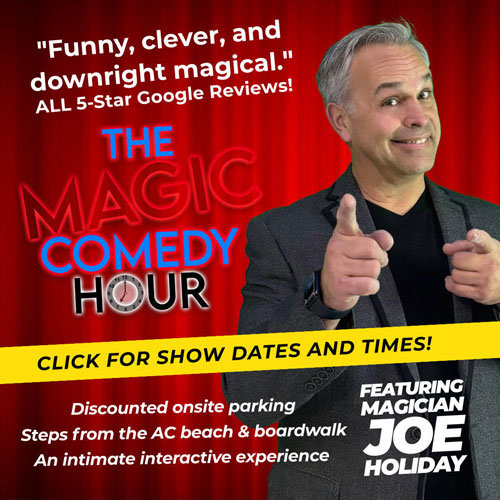By Chuck Darrow
I confess:
When, in 2009 (or early ’10), I learned HBO was planning a new series set in Prohibition-era Atlantic City, I assumed those behind it were doing it just for me. After all, organized-crime history and the history of Atlantic City are among my most passionate interests. And those two subjects are the twin foundations upon which “Boardwalk Empire” was built.
Premiering in September of 2010 and running for five seasons (a total of 56 episodes) “Boardwalk Empire” was inspired by the 2002 book, “Boardwalk Empire: The Birth, High Times and Corruption of Atlantic City” by retired Atlantic County Superior Court Judge Nelson Johnson. As the story goes, HBO suits gave series creator Terrence Winter—hot off writing for “The Sopranos”—a copy of the book figuring he could find a premise for a “prestige” drama within its pages.
While the book covers decades (beginning in the mid-1800s), it was the chapter on 1920s vice overlord Enoch “Nucky” Johnson (no relation to the author) that captured Winter’s imagination. The result was an engrossing, entertaining (if ultra- violent) and quickly paced series that told a multi-layered, near-Shakespearean tale filled with murder, greed, honor, greed, betrayal, greed and lust (including incest). And did we mention greed?
“Boardwalk Empire” was populated by an impossibly talented cast of character actors (including Steve Buscemi as “Nucky Thompson”) portraying compelling, unforgettable figures. Chief among them was Richard Harrow, a horribly disfigured World War I veteran who was essentially the show’s moral center, despite being a stone-cold killer. How Jack Huston didn’t win multiple Emmys for his astonishingly nuanced and sympathetic performance is a mystery for the ages.
Nonetheless, the question—during the five-season run–and beyond—was: How accurate a recreation of that fascinating period in AyCee history did the series offer? To get the answer, it made sense to go right to the source.
“Well, most of the series is fiction and entertainment, not fact and history,” offered author Johnson during a recent interview. “But I understood that before they even began filming.
“I had a good conversation with Terrence Winter, and he said to me, ‘I really like your book, and we’re gonna do a lot with it, but the book can’t fill up seven hours, 12 hours of TV, let alone four or five seasons. So we’re gonna be telling our own story.’”
Thus it was that Buscemi’s Nucky Thompson was a physically slight man, rather than the big and burly figure that was his real-life counterpart. And when it came to Nucky Johnson’s personal life and personality, a good deal of dramatic license was taken.
For instance, one of the series’ main characters was that of Margaret Schroeder, a poor Irish immigrant who becomes Nucky Thompson’s second wife. While “Boardwalk Empire” does accurately include the tragic death of Nucky’s first wife at a young age, there was, according to Johnson, no real-life counterpart for the second Mrs. Thompson.
As he explained, Nucky Johnson had a long-running relationship with a one-time Philadelphia showgirl named Florence Osbeck, whom he married in 1941, just before beginning a sentence for tax evasion (Johnson died in 1968 in a manner totally unconnected to the TV show’s story).
However, the book’s author noted the TV show got right its protagonist’s promiscuity.
Another embellishment concerning Nucky Johnson was his depiction in the show as someone who didn’t hesitate to order the murder of a rival (or do the deed himself). According to Nelson Johnson, there is “zero evidence to support Nucky having people murdered. However, he did have people roughed up to send a message, but even then, it was a special situation.”
And the series’ most grievous omission was no doubt its ignoring of the 1929 conclave in Atlantic City that Nucky Johnson hosted, at which organized crime as we know it was birthed. Making this even stranger is that legendary mobsters like Al Capone, Lucky Luciano and Meyer Lansky—all of whom were depicted in “Boardwalk Empire”—attended the conference.
Not that Winter and his minions made up everything. To the contrary, noted Johnson, they were mostly conscientious when it came to conforming to reality.
“The only time they would contact me,” he recalled, “would be [because] they were committed to historically accurate fiction. So they would ask me, ‘Could this be happening at this time of American history?’ And most times the answer was ‘Yes.’ But sometimes the answer was ‘No.’ And I told them, ‘If you do that, you’re really gonna look foolish in the eyes of people.’
“A perfect example,” he continued, “was when they were talking about election fraud. And they were talking about going after someone in federal court for an election in New Jersey. Well, at the time, it was legally impossible, because as in most instances, elections are governed by states, and the few times that the Feds got involved, it had to be some sort of constitutional issue.
“I know they did regret having done that.”
Johnson, whose other books are “Darrow’s Nightmare: The Forgotten Story of America’s Most Famous Trial Lawyer (Los Angeles 1911-1913),” “Battleground New Jersey: Vanderbilt, Hague and Their Fight for Justice” and “The Northside: African-Americans and the Creation of Atlantic City,” was no doubt compensated handsomely for the rights to his book. But there were other rewards that can’t be registered in a bank statement.
“The first time I met Steve Buscemi,” he related, “he was less than a hundred feet away from where my wife and I were talking to somebody else. And I look up and I see somebody talking to him. When the guy gets through, Buscemi makes a beeline for me, and introduces himself, then tells me, ‘I wanna thank you; this is the best effin’ part I’ve had in my life. And I owe it to you, because without this book, I wouldn’t have this part.’
“That’s how he introduced himself.”
Chuck Darrow has spent more than 40 years writing about Atlantic City casinos.
















